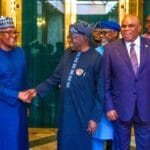Dr. Abdul-Hamid highlights Ghana-Burkina Faso pipeline agreement as a model for regional cooperation to enhance petroleum supply, security
Aina, First Bank Energy Head suggests regional currency adoption in Anglophone Africa to curb FX volatility, citing Francophone stability
Oredola Adeola
Dr. Mustapha Abdul-Hamid, Chief Executive Officer of Ghana’s National Petroleum Authority (NPA), and Ms. Oluwatosin Aina, Group Head of Energy at First Bank of Nigeria Ltd, have called for stronger regional cooperation, introduction of a unified currency, and increased investment in infrastructure to tackle energy challenges in West Africa.
During his keynote session themed “Alliance for Growth – Market Operations and Policy,” Dr. Mustapha Abdul-Hamid, Chief Executive Officer of Ghana’s National Petroleum Authority (NPA), emphasized that no African country can achieve sustainable economic progress by working in isolation.
He advocated for resource-sharing across the region to ensure energy security, citing the need for countries to align their policies and infrastructure.
“We need to pool both human and infrastructure resources across countries to support our economies effectively,” he said.
He proposed that West African countries, within the framework of ECOWAS, should develop political interests aligned with harmonizing regulatory regimes.
This, according to him, would enable countries to benefit from one another’s markets and create a seamless trade environment across the region.
Dr. Abdul-Hamid noted that while the African Continental Free Trade Area (AfCFTA) has provided a platform for collaboration, foreign exchange (FX) issues remain a major obstacle to seamless trade.
“If Ghana imports petroleum products from Dangote Refinery, or Nigeria supplements a shortage by importing from Sentuo Oil Refinery in Accra, both countries must still raise letters of credit in U.S. dollars to complete the transactions,” he explained.
He described this reliance on the dollar for intra-regional trade as a “complex trade crisis” that undermines economic sense.
“Our heavy dependence on U.S. dollars to import petroleum products puts constant pressure on our local currencies, driving up prices and reducing purchasing power. The solution lies in establishing a common currency for West African countries,” he suggested.
Dr. Abdul-Hamid stressed that a regional currency would stabilize economies, reduce FX volatility, and ease the financial burden on countries.
“Ghana alone requires $400 million monthly to import petroleum products, and the figure would be much higher for Nigeria. This persistent dollar demand weakens our currencies and raises petroleum prices,” he noted.
The NPA CEO urged West African nations to go beyond isolated collaborations between regulatory agencies and pursue more comprehensive partnerships at the governmental and monetary levels.
“We need to align our petroleum infrastructure, fiscal policies, and regulatory frameworks. ECOWAS must play a leading role in creating these alliances to fully optimize the region’s petroleum resources,” he said.
He also highlighted the need for joint investments in infrastructure to reduce transportation costs and improve product distribution within the region.
“Transporting petroleum products by road has become expensive and risky, with hazards such as banditry. Countries must collaborate to develop pipelines and other infrastructure,” he said.
Dr. Abdul-Hamid cited the Memorandum of Understanding (MoU) between Ghana and Burkina Faso as a model for regional cooperation.
He stated that under the agreement, a pipeline will be developed from Ouagadougou, through the Ghanaian border, to supply petroleum products efficiently.
“This pipeline will eliminate the need for hazardous tanker transportation and ensure a stable supply to Burkina Faso,” he explained.
In a bid to drive industry-wide collaboration, Dr. Abdul-Hamid shared that Ghana had introduced new regulatory policies to optimize storage capacity.
“Previously, marketers had to show proof of storage capacity to obtain petroleum import licenses.
“However, we found that the country already had surplus storage capacity. Now, we encourage partnerships where one license holder can use the storage facilities of another,” he said.
This reform, he noted, fosters alliances among importers, ensuring not only business success but also contributing to the broader economic stability of Ghana.
“These partnerships are designed to benefit both the companies and the economy as a whole,” Dr. Abdul-Hamid concluded.
Ms. Oluwatosin Aina, Group Head of Energy at First Bank of Nigeria Ltd, echoed Dr. Abdul-Hamid’s call for a unified African currency, emphasizing that it is essential to reducing operational and product costs across the continent.
Ms. Aina made these remarks during the second session titled “Africa 2025 Energy Market – Product Flows and Supply Outlook” at the 18th Oil Trading and Logistics (OTL) Africa Downstream Energy Week summit, held in Lagos on Monday.
She therefore dismissed the belief that local refineries, including Dangote Refinery, would sell Premium Motor Spirit (PMS) in naira, emphasizing that transactions will be conducted in U.S. dollars.
Aina noted that all marketers lifting petroleum products from African refineries, including Nigeria’s Dangote Refinery and Ghana’s Sentuo Oil Refinery, would need to pay in dollars.
She clarified:
“Any marketer purchasing products from Dangote, Sentuo, or any other refinery in Africa will have to make payments in U.S. dollars. No marketer will be able to transact in naira or other local currencies.”
According to Ms. Aina, the end of Nigeria’s fuel subsidy and the introduction of a cost-reflective pricing regime have opened new investment opportunities in the downstream and midstream sectors, leading to increased bankability and transparency in the sector.
“With the subsidy gone, investors are more willing to inject capital into the sector, expecting stronger returns on investment (ROI).
“This makes it easier for banks to provide financial support for petroleum imports and other sector operations,” she added.
However, Ms. Aina highlighted that challenges remain, particularly with the pressure on the naira caused by dollar-denominated transactions. She urged the government to boost non-oil sector exports to improve FX inflows, thereby reducing reliance on the dollar and easing pressure on the local currency.
Explaining the proposition, Ms. Aina cited the success of the European Union’s common currency as an example:
“A unified African currency, similar to the euro, would reduce exposure to dollar volatility and enhance intra-continental trade.
“The African Union should explore launching a common currency under the African Continental Free Trade Area (AfCFTA) framework,” she said.
She added that the existing currency arrangements in Francophone Africa offer a model for stability.
“Francophone countries, with their shared currency, enjoy more stable exchange rates, making their economies less susceptible to FX volatility.
“Anglophone African countries can also explore adopting a regional currency to foster trade and financial stability.”
The Group Head, Energy at First Bank of Nigeria Ltd further stressed that as long as African refineries depend on the global dollar benchmark for petroleum pricing, countries will continue to face challenges with currency depreciation and reduced purchasing power.
“The FX rate is a significant differentiator in product pricing across countries. With local currencies losing value, it becomes increasingly difficult for citizens to afford imported goods, including petroleum products,” she explained.




